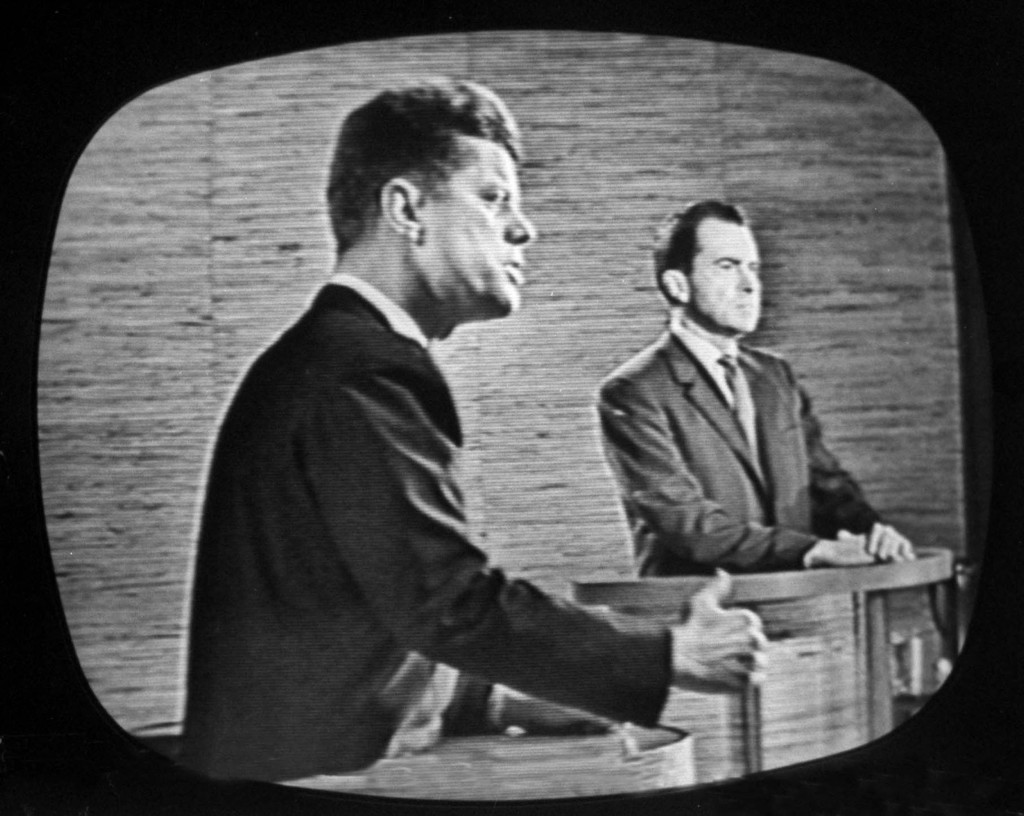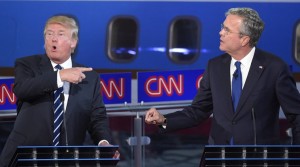
October 7th, 1960
Television was barely a decade old in being available to a substantial cross section of the American public, when it vaulted to the role of ‘decider’ in the nation’s democratic process. On the night of October 7th, 1960, two politicians vetted their philosophies in front of a large shared real time audience, and television was there to frame for all time our memory of it. The U.S. Senator from Massachusetts, John Kennedy was seen by viewers as young but capable, prepared, tanned, energetic, and the promising future; the sitting U.S. Vice President Richard Nixon old, cautious, pale, and the establishment past. The image television perpetrated of Kennedy as clear “winner” was out of keeping with the relative realities of the debate itself. Heard by millions more Americans on the radio, it was Nixon, not Kennedy, that was felt to project a more measured, prepared, and in-depth performance. At 47, Nixon was barely three years older then the ‘young’ Kennedy and had shared with Kennedy the generation’s defining life experience of World War II combat service. Unbeknownst to most everybody, it was Kennedy, not Nixon, who was sickly and medicated, only still recovering from an Addisonian crisis several years previously. It was Kennedy, not Nixon, who declared a nonsensical ‘missile gap’ existed between the Soviet Union’s capabilities and that of the United States, ignoring that fact that the US had a several hundreds times more nuclear delivery capacity, but clearly designed to reinforce the vision of the shock of Sputnik in the uninformed audience’s mind.
Kennedy, following the debate, secured public perception as ‘up to’ the job of President with his projection on TV that night, and defeated Nixon in one of the closer elections in US history. Television, as the new media, found in its discovery of Kennedy’s on screen projection, the definition of ‘telegenic’, and was happy to promote the Camelot myth of a young vibrant President and his family as the new definition of leader. Camelot sold a lot of television sets.
In the 55 years since that debate, television has ruled supreme as the venue for definition of a politician, and has guarded that role ruthlessly. Television was adversarial to Lyndon Johnson and particularly Nixon, despite their political success, as they projected poorly on television, and prominently in Nixon’s case, saw the media as the enemy in defining their public perception. The media wanted Reagan to fail, painting him as dangerous and a dullard, but television could not undercut his telegenic presence, that masterfully projected calm, dignity, and humanness.
As television moved into its middle ages as a media force, it has rallied to the need to re-instill the Kennedy magic, first through Bill Clinton, and in a tour de-force, Barrack Obama. Clinton, who nearly put every viewer into a coma with his 1988 droning, overwrought Democratic National Convention speech, finally achieved telegenic Valhalla wagging his finger at the camera, denying sexcapades in the White House and inventing the political television reality show. Obama preened in front of Greek columns and claimed olympian talents of controlling sea levels and ending division on the strength of his world diversified telegenic projection, echoing Kennedy but with a fraction of the political grasp or respect for process. Television needed to balloon these two in particular because the threat of the internet to be even more real time and defining than television, was slowly becoming a reality and threat to the force that television played in defining our discourse.
Unfortunately for television,, the emerging media, the social media through the internet, has loosened television’s tight grip on the narrative. Progressively, the internet has screwed severely with the narrative television has been built to project. The Internet has broken down multiple fortifications television had built around its star child Obama as the global unifier and the smartest man on the planet. Television media groups were stunned when it positioned Donald Trump for collapse by projecting his most stupid, offensive comments and discovered the more he did it, the more the Internet liked what it heard. Trump has thus far proved immune to television defining of him, because he has turned out to be the hybrid, fully cognizant of the reality show deterioration of television and the synthesis of the visual with the immediate and emotional qualities of the Internet.
The latest debate of Republican candidates shows television trying to respond to its slipping position as the primary media vehicle to define this nation’s direction. A large group of diversified, intelligent, and capable conservatives is not exactly what television has in mind when it sees itself as owner and pathfinder for the nation’s consensus. The debate was designed by CNN to be part reality show and part circus side show.

The idea was to develop a bunch of mudslinging matches that would show the nation the pettiness and vacuousness of the Republican field, and distract from the emerging disaster that is Hillary and her effect on the virtuous party, the Democrats. Fox was stunned when 24 million Americans tuned in to see the first debate, and CNN wanted to magnify the Trump celebrity factor to make the irrelevant cable network seem relevant again. More than 20 million Americans tuned in to see this second debate. CNN treated them to questions like, ‘Mr Trump says you’re ugly, what do think of him’, ‘Mr. Bush speaks Spanish, shouldn’t he speak English?’ , and ‘ Mr. Paul, Mr. Trump says you don’t belong on this stage, because you only poll at 1%, how do you feel about that?”‘ – among other questions, in this most dangerous and serious of times. Despite CNN’s best attempts, surprisingly and progressively though, an actual debate broke out in the second half, and this bright field of candidates began to find its legs and maneuver into serious discussion, directed at the internet generation, more directed, and personal, and deliberative. Stream of consciousness born for Internet discussion started to develop that television struggles with – What do living fetus organ harvests say about our nation’s character? What are the consequences of citizenship? How does the nation achieve personal highways to success for the most people? What are our mechanisms for dealing with a dangerous world? Progressively, no one missed the visual references as to who is the prettiest, shortest, meanest, or tanned. The celebrity Trump was mollified, quiet, and progressively a non-participant.
Television is in danger of being marginalized into the corner of an internet screen feed, competing with the huge diversity of opinion drivers available. The concept of the nation huddling around the television in the living room is becoming a dated concept in the same way that the newspaper delivered to the door once connected our thoughts. Something that may be quite profound is beginning to project with the lack of message control that once dominated our thoughts through the visual media. It may turn out that the huge audiences are continuing to tune in to the debates, are doing so not so much to watch as to organize their own thoughts. The debate the other night, so designed to define our way of thinking, may have initiated our journey back to a more town hall vetting of ideas, shorter on visual magnetism and longer on the victory of ideas. Whatever comes after television, an internet nourished democracy built on ideas, not personalities, may not be the worst thing The Trump personality comet may actually come to represent nadir of visual consensus, fundamentally mis-interpreted. It may actually be speaking to the final divorce with forced consensus based on visual manipulation. The Trump factor may be saying, we will form our own opinion, thank you. And now we will start looking to the pathfinders that can articulate the ideas that we form. That kind of media democracy might finally put us back on the path to salvation.